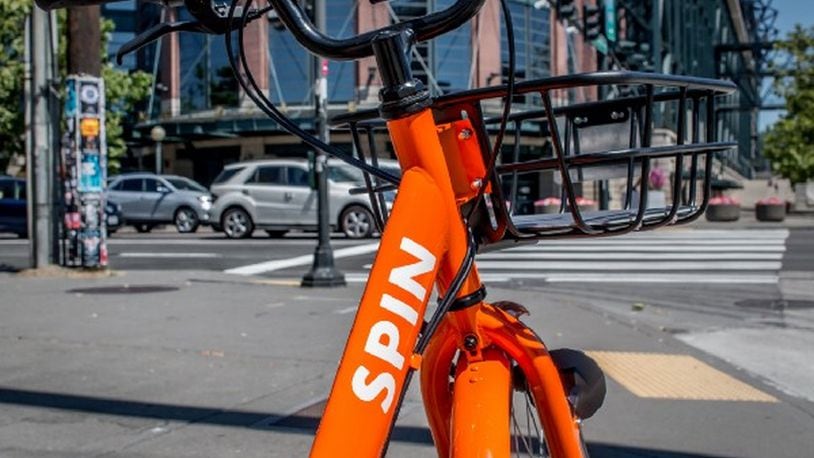Maggie Callaghan, Miami’s student body president this year, said a bikeshare program was something she and two others wanted to see on the campus when they came here as freshmen.
MORE POPULAR STORIES
MUST-SEE: These incredible images show Butler County in a way you haven’t seen it
5 things to know about the new Duck Donuts coming to the area
“When we came here freshman year, it was something to work on. This year, everything fell into place,” Callaghan said. “Most bike sharing (businesses) have stations. Spin is stationless. I think students will like it. It’s easy, even for the not-so-tech-savvy.”
Callaghan said her role has been behind-the-scenes this academic year because of her post as student body president. She credits Alex Wortman, the secretary for infrastructure and sustainability for Associated Student Government, and Sean Perme, ASG secretary for off-campus affairs, with bringing a bike sharing pilot program to Oxford.
All three appeared before Oxford City Council Feb. 6 to talk about the Spin program and explain the pilot program planned for later this semester.
The bikeshare program will be open to community residents as well as students, they explained, and the firm will bring an estimated 15 to 20 jobs to the area. They asked council to consider signing a Memorandum of Understanding with Spin, permitting them to operate here, but Wortman explained there is no liability for the city. It is not a contract, he said, merely an authorization to proceed and a way to make the city aware of the program operating here.
Mayor Kate Rousmaniere, a bicyclist herself, said they would have the memorandum reviewed by the city’s law director and consider having a resolution to approve it on this Tuesday’s meeting agenda.
The city’s Student Community Relations Commission had a prior presentation from Spin about their program.
“It’s nothing but a good thing,” said Council member Glenn Ellerbe, who serves on the SCRC. “I hope by the (next) February meeting we can have a resolution for the manager to sign the Memorandum of Understanding.”
Wortman told Council it would be approximately four weeks after signing the MOU before the pilot bikes could be in use here, which would make it shortly after Miami’s Spring Break. He said approximately 50 bikes would be brought here for the pilot program with an estimated 150 when the program goes full in August.
Later, he spoke about the process of getting a bike sharing program here after it seemed the university was close to starting one two years ago.
“I always liked bike sharing. My sophomore year, I was elected to student government and the university seemed close to signing with the station model. I went abroad my junior year and when I came back, I expected bikes,” Wortman said. “The university did not do it. Sean and I said, ‘Let’s do it.’ ”
Perme is a co-leader of SCRC and they hosted Chris King, campus partnerships manager for Spin, in December. King brought along one of the bikes, which helped convinced those involved the company was the right choice for Miami and Oxford.
The bikes are specially made for Spin with GPS for tracking their locations and a locking function the user can access with a phone app. Wortman explained the bikes have a mechanism behind the seat which locks the rear wheel of the bike.
The app will allow a user to learn the location of the nearest Spin bike and reserve it so only that person can unlock it, but that must be done within 10 minutes. Once unlocked, the customer can ride it for transportation or recreational use and just leave it for the next person who needs it, using the app to lock it again and end that rider’s time of use.
Users can ride the bikes for 50-cents for each 30 minutes or buy an annual pass at $100 for community residents for unlimited use for a calendar year or $50 for Miami students or those with Miami e-mail accounts.
“The bikes are specially made and branded bright orange,” Wortman said. “We asked about red for Miami but they are orange. It’s their branding and business model.”
It will be possible to ride the bikes out of Oxford, but they must be left within the city limits for their “geo fence” to lock the bike and end the user’s time with it.
The jobs to be created will involve a Resource Team of licensed bike technicians to set up and repair bikes and people to keep track of the where the bikes are left—possibly moving them to more convenient locations—as well as responding to complaints about they are left. Such comments can be made to them on-line.
Wortman was asked at the Council meeting if they had spoken to Bikewise owner Doug Hamilton and he said he was not sure if any substantive discussion had happened but Spin is aware of the local business as a possible repair and upkeep resource.
Spin was founded in San Francisco in 2016, as a start-up using help from other businesses such as Y Combinator, Uber, Lyft and other technology companies.
Callaghan credited Wortman and Perme with the work of contacting bikeshare companies and talking about the process. She said as Student Body President her role was more behind-the-scenes. She said the firm’s liability insurance coverage is the best they investigated.
“It’s not something I campaigned on. I have been working on other projects with the city, like getting a movie theater back here. My work has been getting Miami on board and connecting people. Facilitating,” Callaghan said. “There will be problems. We will work through them. This is a very bike-friendly community. It is the quintessential place for a program like this. It has worked in bigger cities, like San Diego. If it worked there, it will certainly work here.”
About the Author
